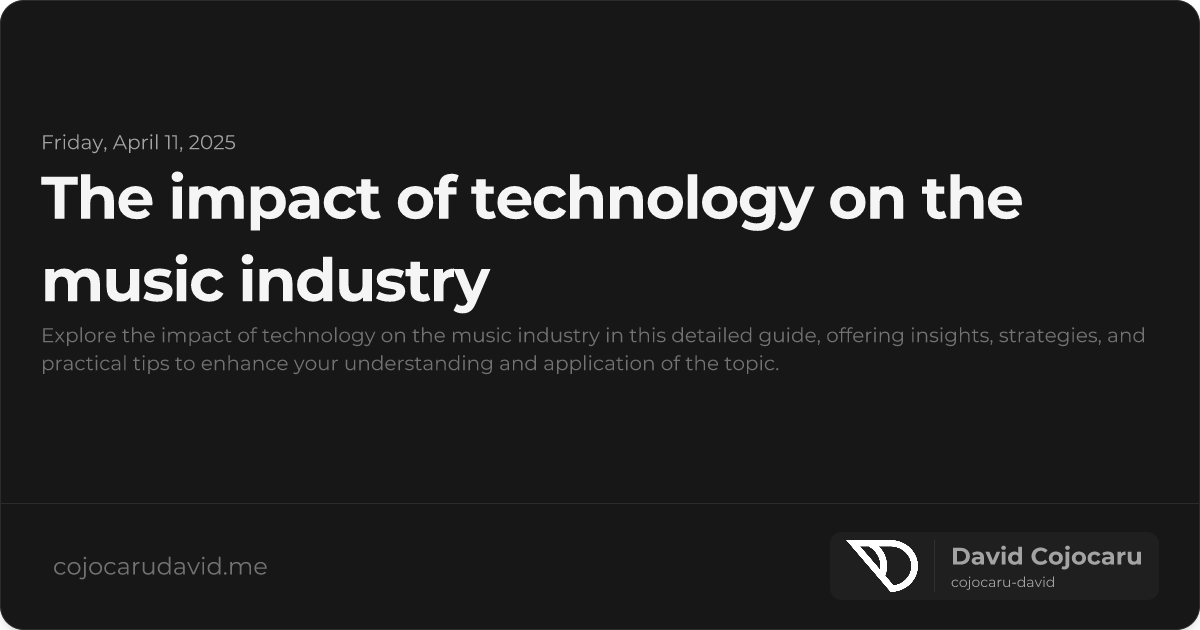The Digital Revolution: How Technology Reshaped the Music Industry
Technology has irrevocably transformed the music industry, revolutionizing how music is created, distributed, and experienced. From the humble beginnings of analog recording to the cutting-edge world of AI-generated compositions, technological advancements have impacted every facet of the field. This blog post delves into the key ways technology has reshaped music, exploring its influence on production, distribution, live performances, and the ethical considerations that arise.
The Evolution of Music Production Through Technology
Digital Audio Workstations (DAWs): Democratizing Music Creation
Forget expensive studio sessions! Today, artists can craft high-quality tracks using Digital Audio Workstations (DAWs) like Ableton Live, FL Studio, and Logic Pro. DAWs have democratized music production by offering:
- Affordable Accessibility: Eliminating the need for costly equipment and studio time.
- Unprecedented Editing Capabilities: Enabling precise manipulation of vocals, beats, and effects.
- Seamless Collaboration: Facilitating real-time remote collaboration between artists, regardless of location.
AI and Machine Learning: The Future of Music Creation?
Artificial intelligence is no longer a futuristic fantasy; it’s actively participating in music creation. AI tools are composing melodies, mastering tracks, and even emulating the styles of renowned artists. Platforms like OpenAI’s Jukebox and LANDR automate mixing and mastering processes, making professional-grade sound accessible to independent musicians and leveling the playing field.
The Streaming Era: A New Paradigm for Music Distribution
From Physical Formats to Digital Streams: Access Redefined
The transition from physical media like CDs and vinyl to streaming services such as Spotify and Apple Music has fundamentally democratized music access. The key benefits include:
- Instant Global Reach: Enabling artists to share their music with a worldwide audience instantly.
- Personalized Music Discovery: Algorithms curate personalized playlists and recommendations based on individual listener preferences, expanding horizons and introducing new artists.
- Evolving Revenue Models: While offering unparalleled reach, lower per-stream payouts continue to be a significant challenge for artists, prompting ongoing discussions about fair compensation.
Social Media: Launchpad for the Next Generation of Artists
Platforms like TikTok and Instagram have emerged as powerful launchpads for viral hits and burgeoning artists. Short-form videos, dance challenges, and user-generated content drive trends, providing unprecedented opportunities for unknown artists to gain overnight fame and build dedicated fanbases.
Reinventing the Live Music Experience
Virtual Concerts and Immersive VR Experiences
Advancements in virtual reality (VR) and augmented reality (AR) have opened up exciting new avenues for live music experiences. Artists like Travis Scott and Marshmello have hosted groundbreaking virtual concerts within platforms like Fortnite, offering:
- Unparalleled Global Accessibility: Allowing fans from around the world to attend concerts regardless of geographical limitations.
- Immersive and Interactive Experiences: Enhancing engagement through interactive visuals, stunning special effects, and personalized elements.
AI-Powered Fan Engagement: Building Deeper Connections
AI-powered chatbots and tools are revolutionizing fan engagement, allowing musicians to connect with their audiences on a more personal level. These tools facilitate personalized messages, virtual meet-and-greets, and even AI-generated merchandise designs, fostering stronger artist-fan relationships.
Navigating the Challenges: Ethical and Legal Considerations
Copyright, Piracy, and the Digital Landscape
While technology fuels creativity and innovation, it also presents significant challenges related to copyright and intellectual property:
- Unauthorized Sampling and AI Replication: The ability to replicate voices and create music using AI raises concerns about unauthorized sampling and the potential infringement of artists’ rights.
- Combating Streaming Fraud: The prevalence of fake streams and bot-driven activity distorts royalty payouts and undermines the integrity of the streaming ecosystem.
The Future of Human Creativity in the Age of AI
As AI-generated music becomes more sophisticated, fundamental questions arise about the role of human creativity. Will machines eventually replace human artists, or will they primarily serve as collaborative tools that augment human capabilities and unlock new creative possibilities?
Conclusion: Embracing the Evolution of Music
The impact of technology on the music industry is profound and multifaceted, presenting both unprecedented opportunities and complex challenges. From AI-assisted production and personalized streaming experiences to the blurring lines between virtual and physical performances, innovation continues to redefine how we create, consume, and experience music. The key lies in embracing these advancements responsibly, ensuring that technology empowers artists, protects their rights, and enriches the lives of music lovers worldwide.
“Technology has unlocked a boundless realm for music – a space where creativity intertwines with code, and the next chart-topping hit can emerge from anywhere, at any time.”

